
ALEKSANDR KAZACHKOV, PH.D., RECEIVES NATIONAL SCIENCE FOUNDATION CAREER AWARD TO MAKE SMARTER AND MORE EFFICIENT DECISIONS FOR SOCIETAL SYSTEMS


ALEKSANDR KAZACHKOV, PH.D., RECEIVES NATIONAL SCIENCE FOUNDATION CAREER AWARD TO MAKE SMARTER AND MORE EFFICIENT DECISIONS FOR SOCIETAL SYSTEMS
To be sure, 2024-25 has been monumental for the Department of Industrial and Systems Engineering. As I write this, our COBOD 3D construction printer is up, layering concrete into walls and gearing up to be a critical curriculum component that may change the face of construction.
Now sharing space in “the Pit” (or Structures and Materials Laboratory) with UF’s national championship concrete canoes in Weil Hall, the printer is among many ISE highlights this year. This magazine showcases a year of excellence, allowing us to reflect on the accomplishments of our alumni, faculty and students.
ISE continues to win grants that fuel research with powerful, real-world implications.
In this issue, we visit, for example, the lab of ISE Assistant Professor Aleksandr Kazachkov, who won a National Science Foundation (NSF) Faculty Early Career Development (CAREER) award to develop integer optimization technology that may enhance power system operations, vehicle routing and even organ transplant allocation. His research will enable faster solution times and more complex models for challenging operational problems. Please take a moment to read about his impactful research.
Thanks to another NSF award, ISE Assistant Professor Minhee Kim and I are working on integrating generative design for the design of facades to achieve efficient energy usage in buildings. You also will read about ISE Associate Professor Xiang Zhong, who is working on two critical NSF health-related projects. Her groundbreaking work – data-driven modeling as it relates to hospital planning during the COVID-19 pandemic and using AI to improve intensive care delivery – is shaping the future of engineering.
Find out about our Tetris 99 challenge during a trip to the 2024 Institute for Operations Research and the Management Sciences (INFORMS) meeting in Seattle. At the meeting, students and faculty showcased our department’s research, while our staff engaged in disseminating information about our graduate programs.
Speaking of amazing students, this issue features a profile on Yousef Bani Ahmad, a former equestrian athlete from Jordan and current ISE graduate student who won one of UF’s coveted International Student Achievement Award in November.
In this issue, we remember the late Carlos del Sol, a
dedicated member of our ISE Advisory Board and longtime friend of the department. We also note the passing of Glenn Renwick, the former Progressive Insurance CEO and distinguished alumnus whose substantial UF donations continue to support engineering.
We also honor the induction of two celebrated alumni into the ISE Hall of Fame Eric Stern and Kevin Teehan. Their achievements in industry and service to the engineering profession and the university are truly inspiring. They exemplify the impact of an ISE education and the enduring strength of our alumni network.
As for that 3D construction printer, the BOD3 will enable innovative ISE and multidisciplinary research leading to the future of construction, Infrastructure 5.0 – a convergence of expertise in optimization, data analytics and modeling, supply chain, and materials and manufacturing, thus revolutionizing construction and transportation applications.
So many big ideas are powering ISE these days, and we are proud of our momentum. Please spend time with this magazine to learn more about ISE’s programs, progress and excellence. Thank you for being such a critical part of our vibrant ISE community.
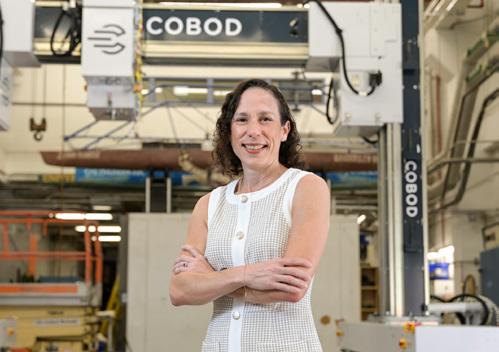
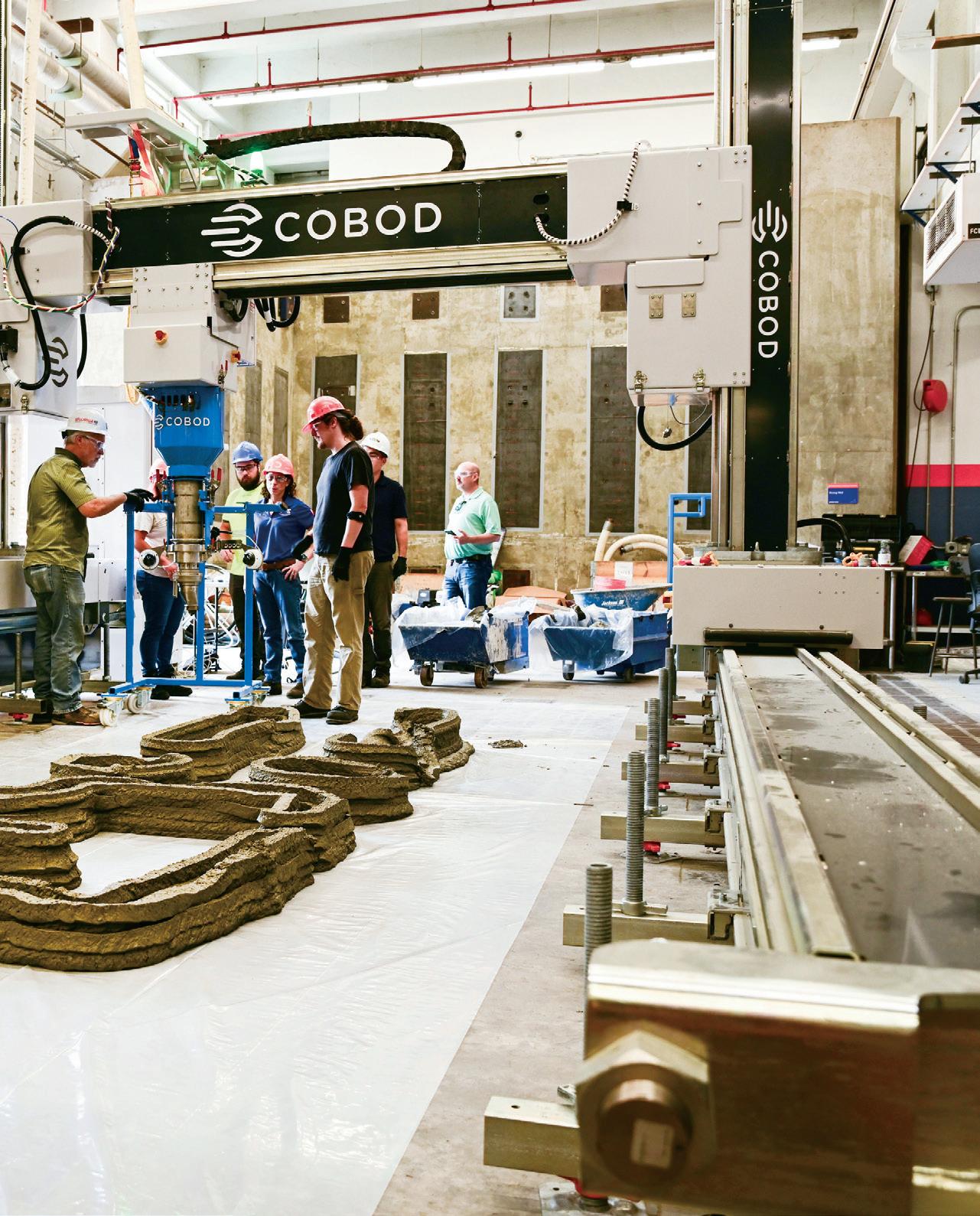

Jad Atweh, Ph.D.
Instructional Assistant Professor
Atweh’s research explores the integration of human factors, eye tracking and human–AI collaboration to enhance team performance and safety in complex systems. His work focuses on human–machine interaction, real-time gaze sharing and interruption management, particularly in unmanned aerial vehicle command and control (UAVC2) settings. His interdisciplinary approach blends systems engineering, cognitive science and data-driven methods to design smarter, more responsive technologies. He holds a bachelor’s degree in industrial engineering from the American University of Beirut, and he earned a master’s and Ph.D. in systems engineering from the University of Virginia.
Fatemeh Nosrat , Ph.D.
Assistant Professor
Nosrat’s research lies at the intersection of operations research, healthcare decision-making, and pricing and revenue management. Her work focuses on data-driven decision models in cancer care, adaptive radiation therapy, and assortment and pricing strategies under network effects. Her research employs tools from optimization, stochastic modeling and choice theory to improve outcomes in complex, real-world systems. She earned her Ph.D. in industrial engineering from the University of Minnesota in 2022 and holds M.Sc. and B.Sc. in mathematics from the University of Tehran. Prior to joining the University of Florida, she was a postdoctoral research associate at Rice University and a visiting postdoctoral associate at MD Anderson Cancer Center in Houston, Texas.
Jia (Peter) Liu , Ph.D.
Trey Lauderdale Industrial and Systems Engineering Faculty Fellow, Associate Professor
Liu’s research centers on the intersection of statistical modeling, machine learning and advanced manufacturing, with applications in quality control, fatigue life prediction and smart factory systems. His work advances physics-informed sensing and multimodal data analytics for additive manufacturing and electronic materials, with a focus on critical applications in aerospace and defense. Liu received his Ph.D. in industrial and systems engineering and master’s in statistics from Virginia Tech, and holds a bachelor’s and a master’s degree in electrical engineering from Zhejiang University. Prior to joining the University of Florida, he was an associate professor in the Department of Industrial & Systems Engineering at Auburn University.
By Brady Budke
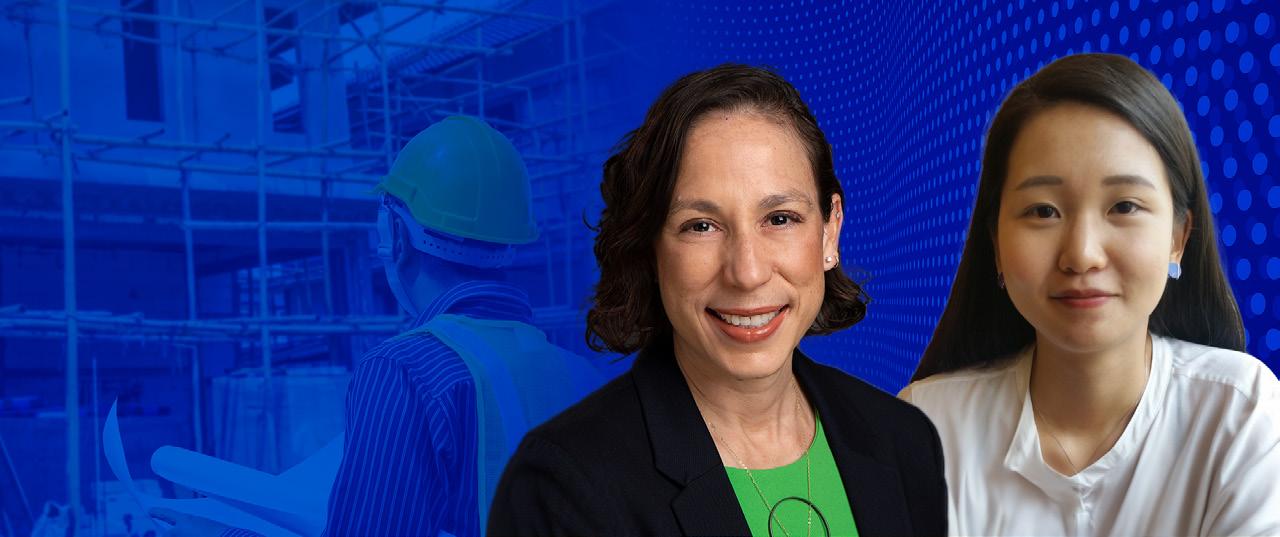
The National Science Foundation (NSF) Division of Civil, Mechanical and Manufacturing Innovation has awarded a collaborative grant totaling over $830,000 to a multidisciplinary team comprised of researchers at Iowa State University, the University of St. Thomas in St. Paul, Minnesota and the University of Florida. The team consists of architects, as well as engineers from civil, industrial and mechanical disciplines. At UF, the project’s activities will be led by principal investigator Iris V. Rivero, Ph.D., chair of the Department of Industrial & Systems Engineering and the Paul and Heidi Brown Preeminent Chair in Industrial and Systems Engineering, and co-principal investigator Minhee Kim, Ph.D., assistant professor. The duo will work on defining means to implement low-energy design concepts to infrastructure to assist mitigating ongoing climate change issues.
“The larger-scale societal impact projects affecting climate change require a multipronged approach to devise effective solutions,” Rivero said.
Kim agreed, saying that they were “motivated by how much buildings contribute to the global carbon footprint” and that “the construction and operation of buildings consume a huge amount of energy.”
Under the Civil Infrastructure research for climate change Mitigation and Adaptation (CLIMA) project, Rivero and Kim’s research is set to encourage new engineering systems that can be adjusted by altering stable states, which will require no energy to maintain the system in a given position. This will open a new path of structural system concepts in both new and existing structures.
“We believe that the incorporation of manufacturing design and processes into architectural design and structural engineering will uncover new paradigms in construction. Specifically, addressing design with the purpose of achieving sustainable construction,” Rivero said.
Kim said, “Designing these adaptive systems is complex, especially with multistable mechanisms that need to shift between different stable states. Then there’s the challenge of
manufacturing them at scale while keeping costs low. Plus, we need to make sure these systems are durable and meet architectural standards.”
Rivero explained that “by bringing together manufacturing systems modeling to predict performance of large-scale infrastructure and our expertise in additive manufacturing, we will be able to fabricate efficiently and with reliability.”
Along with these new systems, the CLIMA project will focus on the theme of climate change and how it can be mitigated moving forward with these structures. This will include looking at ways to reduce raw materials, maximizing utilization of materials, efficient manufacturability and improving sustainability and resilience of buildings.
“The ability to be able to respond quickly to reestablishing infrastructure affected by natural disasters, or being able to carry out construction in difficult-to-reach environments, are among some of the applications with greater and possibly unaccounted, thus far, impact,” Rivero said.
Kim explained, “For everyday infrastructure, it means lower energy costs, improved comfort and buildings that can better handle different climates. Communities could see real benefits, whether it’s saving on heating and cooling or having buildings that are more resilient to climate challenges.”
Rivero and Kim’s research is also set to include educational methods that can be integrated for the next generation of engineers and architects who have an interest in adaptive structural systems.
“One of the exciting parts of this project is the Undergraduate Research Travel and Exchange Program, which connects students across three universities,” Kim said. “We’re also integrating these findings into resources for younger students in grades K-12, which helps introduce them to ideas like energyefficient buildings and climate adaptation early on.”
Rivero mentioned, “With this program, students will have the opportunity to learn about how different terrains and climates affect efficient design for infrastructure.”
By David Schlenker
Xiang Zhong grew up with her role model.
“My mother was an engineering faculty member in a Chinese university,” said Zhong, Ph.D., an associate professor in the Department of Industrial & Systems Engineering. Her mother, Yumei Cui, continues to set an example for her daughter; at age 63, Zhong said, Cui is learning English so she can communicate better with her grandchildren.
“She always encouraged me to study math and engineering,” Zhong recalled, “and she believes that girls are as good as boys in studying STEM.”
No doubt. In fact, Zhong is now a celebrated University of Florida researcher with an eye on using AI modeling and data analytics to improve patient experiences in healthcare. Currently, she is working on two projects funded by the National Science Foundation (NSF):
■ Data-Driven SEIRI Modeling and Hospital Planning and Operations for the COVID-19 Pandemic
■ A Causal AI Digital Twin Framework to Transform Intensive Care Delivery
Zhong is co-director of the HEALTH-Engine Lab at UF. Her expertise is in data analytics with applications spanning healthcare, service and production systems. She has a special interest in automation.
“Automation engineering focuses on creating intelligent systems that can perform tasks automatically, combining elements of engineering, computer science and information technology,” she said. “I was intrigued by the potential of these technologies and wanted to explore more, so I pursued a Ph.D. in Industrial Engineering at the University of Wisconsin Madison.”
Here is more information on one of ISE’s brightest stars.
> WHERE DID YOU GROW UP?
I grew up in China. I was lucky to attend one of the top
universities in China, Tsinghua University, and study automation for my bachelor of science degree.
> WHY DID YOU CHOOSE YOUR CAREER?
During my Ph.D. study, we explored how industrial and systems engineering principles can be used to improve the design and operation of care-delivery systems (how to improve patient access to primary care, how to reduce patient wait times in emergency departments). Inspired by the feedback from our clinician collaborators who would like to see more collaboration between physicians and engineers, I decided to become faculty in a research university, advance research in health-systems engineering, train the next generation of engineers and promote collaboration between researchers in engineering, healthcare operations and medical science.
> HOW WILL YOUR RESEARCH HELP PEOPLE?
My research aims to advance operations research and systemsengineering approaches to address the operational challenges of healthcare delivery systems in the digital era. Healthcare delivery systems are complex and dynamic socio-technical systems that impose significant challenges to comprehend, manage, and control. Consequently, healthcare systems worldwide have suffered long-standing efficiency and access issues that negatively impact the well-being of human beings and their quality of life.
Healthcare delivery is at the dawn of a foundational change in the new era of smart and connected healthcare, referred to as “healthcare 4.0.” This new vision significantly expands the social and technical capabilities of care delivery; however, this also demands innovative research to understand the impact technology and new business models have brought to the current healthcare system and address the optimal integration and implementation of the emerging technology into the current system to realize its vision.
The project that I am very enthusiastic about is one currently funded by NSF’s Smart Health and Biomedical Research in the Era of Artificial Intelligence and Advanced Data Science program. Working with healthcare professionals from the Mayo Clinic Rochester, we aim to advance the digital twin technology with the application to intensive care delivery.
Digital twins integrate artificial intelligence, simulation and Internet of Things (IoT) technology to create a computational counterpart for a real physical system for system design, monitoring and life-cycle improvement. Digital twins have revolutionized several industries, such as manufacturing, urban planning and construction. However, for the digital twin concept to materialize in healthcare, many factors may come into play. The sheer computing power required to run simulations of the human body or even individual organs can be intimidating. Current works mainly focus on a single organ to develop its digital replicas in an experimental setting.
Meanwhile, care delivery exemplifies a complex adaptive system where team-based caregivers communicate and interact with each other internally and with patients throughout their care journey. How to integrate models at the patient level and process level, accounting for the real-time input from IoT devices, is a cutting-edge research area. We have already developed a prototypical patient digital twin iOS application to simulate a patient’s clinical trajectory in the first six hours since their intensive care admission as an educational tool. We are working on integrating patient simulation with ICU system simulation to support ICU operations.
After graduating from UW Madison (2016), I joined UF as an assistant professor at ISE. The department was trying to expand its research portfolio to include ISE applications in healthcare at that time, and I, with other new hires in the subsequent year, co-founded the HEALTH-Engine lab. Together, more than 10 Ph.D. students graduated from the HEALTH-Engine lab.
> WHAT IS YOUR FAVORITE THING ABOUT UF?
I love the collegial environment of the ISE department and am glad to see its expansion to other important research areas such as human and health systems and manufacturing systems over the years. The department is “young” — we have many junior and mid-career members — and the vibe is great.
The UF campus is beautiful. I was very impressed by the beautiful live oak trees decorated by the Spanish moss, unique to a southern climate.
> WHAT DO YOU LIKE TO DO WHEN NOT TEACHING OR RESEARCHING?
Birding. I go to Sweetwater Wetlands Park or La Chua Trail and enjoy the serenity, and shoot photos of great herons and egrets fishing and snail kites catching apple snails.
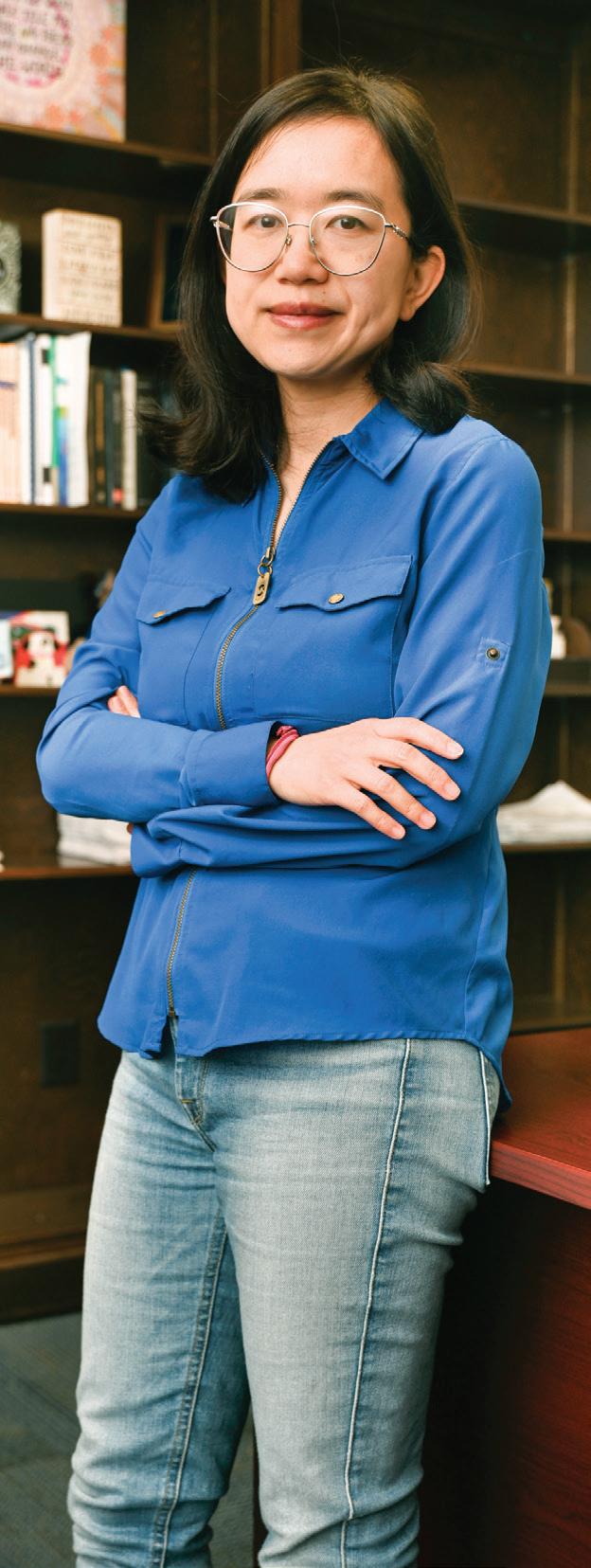
By David Schlenker
Iris Rivero, Ph.D., chair of the Department of Industrial & Systems Engineering, has been named a fellow with the prestigious Society of Manufacturing Engineers (SME).
“This is the highest distinction you can get in your field. To be nominated, you have to have made an impact in your field throughout the years, and, in my case, it is manufacturing,” Rivero said shortly after receiving the news. “Manufacturing is something that I eat, live and breathe all the time.”
Since 1986, the SME College of Fellows has honored members who have made outstanding contributions to the social, technological and educational aspects of manufacturing. The honor is awarded to those with 20 years or more of experience.
“Dr. Iris V. Rivero was selected for the prestigious SME Fellow designation in recognition of her transformative contributions to manufacturing engineering through research, education and professional leadership,” noted Ben Wang, Manufacturing Systems chair and professor emeritus at Georgia Tech University. “Her qualifications as an SME Fellow are rooted in her longstanding technical excellence and educational innovation.”
Wang cited Rivero’s 100-plus publications, multiple patents and talks, noting she consistently bridged the gap between lab-based innovation and industrial application, particularly in additive and hybrid manufacturing.
“Her research on sustainable manufacturing, such as the use of directed energy deposition for remanufacturing large metal components, directly addresses critical environmental challenges in U.S. industry,” Wang added. “She has also modernized manufacturing education by designing hands-on, industry-engaged courses and establishing new curricula in nondestructive testing, lean manufacturing and biomanufacturing — efforts that have inspired student research and catalyzed new faculty hiring.”
Rivero said she received the SME fellow news in March – “It was one of the best days of my life.” She was formally inducted at the Manufacturing Technology Series WEST conference in October in Anaheim, Calif.
“When I was a youngster, I received the SME Outstanding Young Manufacturing Engineer Award, and it was presented at the same gala,” Rivero said. “I got to see the fellows, and I was like, ‘Wow, I wonder if someday I’ll get there.’”
Rivero said ISE is growing, in large part due to its reputation for hands-on learning.
“The main difference is providing a hands-on approach and not just seeing it in a textbook or talking about it in a class,” she said. “Having the equipment to be able to go and do things makes a
big difference.”
Rivero is responsible for securing ISE’s biggest piece of handson learning: the BOD3 3D construction printer, one of the largest 3D construction printers in the country and the first of COBOD’s new third-generation models sold in the United States.
The printer will be incorporated into curriculum for multiple departments in the Herbert Wertheim College of Engineering, including lessons and projects in construction, manufacturing, materials, data analytics and operations research, structural health monitoring, coastal resilience, safety, design and sustainability.
“UF’s Industrial and Systems Engineering department will lead the path in defining one-of-a-kind, infrastructure-driven interdisciplinary research and education,” Rivero noted after the printer arrived last year.
Born and raised in Puerto Rico, Rivero became fascinated with machines and manufacturing thanks to her father and grandfather, who fixed muscle cars and had a lathe in his house.
“We would make things, and that sparked my attention,” she said. “My father also worked in manufacturing. He and my grandfather owned a foundry in Puerto Rico, and they made water meters and manhole covers.”
She shadowed them in all incarnations of creating and repairing machines.
“Cars were my first passion, then I switched to airplanes, then space,” said Rivero, whose first car was a 1998, eight-cylinder Oldsmobile. “Through school, I knew I wanted to do something related to engineering. I always was attracted to cars, but I also had an interest in business and business logistics. My dad said, ‘If you have an interest in business and also in manufacturing and cars, instead of mechanical [engineering] consider industrial.”
She earned her bachelor’s, master’s and doctoral degrees from the Pennsylvania State University, all in industrial and manufacturing engineering. She became UF’s ISE chair in 2024.
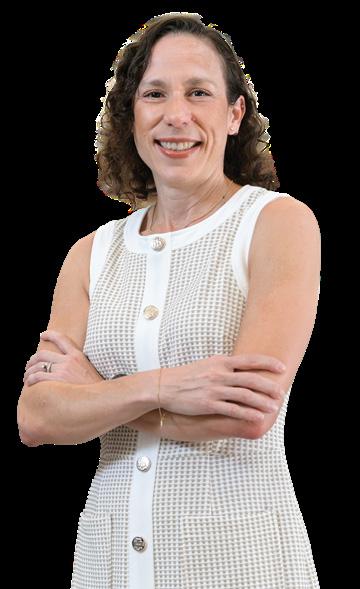
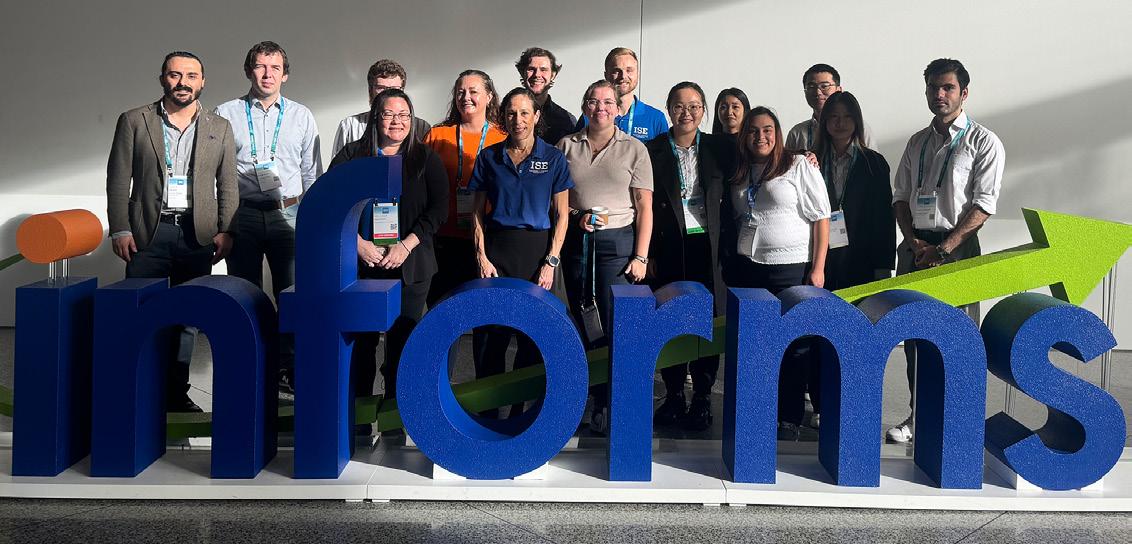
By Brady Budke
Students, faculty and staff from the Department of Industrial & Systems Engineering (ISE) at the University of Florida made a trip to the Pacific Northwest last October to attend the 2024 Institute for Operations Research and the Management Sciences (INFORMS) Annual Meeting at the Seattle Convention Center. The department had a range of representation, which included an exhibit booth showcasing the department and its graduate programs, student and faculty research presentations, and a co-hosted reception alongside a handful of various universities.
“The INFORMS annual meeting is the most important large-scale venue for students and faculty in the discipline of operations research and data analytics,” said Aleksandr Kazachkov, Ph.D., ISE assistant professor and faculty advisor for the INFORMS UF Student Chapter. “It offers opportunities to efficiently communicate research findings to a wide audience, meet collaborators to start or progress projects, learn about the latest research and trends through technical talks, affect the future of the field through important society business meetings, connect with companies that can highlight the latest methodological areas that can benefit from research, and attend mentoring sessions for faculty with funding agency representatives and by students with future employers.”
At the exhibit booth, the department hosted a Tetris 99 challenge as a way to engage attendees on the topic of operations research. Over three days, participants battled for the high score and the grand prize of a UF ISE pickleball set. This gave the department the opportunity to showcase the Center for Applied Optimization (CAO) to a broad audience, requiring them to answer a question about the center before playing. The Tetris 99 winner was Chrysafis Vogiatzis, Ph.D., a teaching associate professor in the Department of Industrial & Enterprise Systems Engineering at the University of Illinois Urbana-Champaign and a UF ISE alumni.
“Seeing that Chrysafis was our winner and that he earned two
degrees with our department was exciting,” said Iris V. Rivero, Ph.D., department chair. “It showcases the reach UF ISE has around the country, and it turned out to be a fun way for him to represent his alma mater all the way in Illinois.”
In addition to networking at the exhibit hall, INFORMS allows students, faculty and others who are interested to present their research in various sessions. The theme for this year’s annual meeting was “smarter decisions for a better world,” which presenters were to incorporate into their research projects.
“Presenting at the INFORMS Annual Meeting provided a valuable platform to share my research with experts in the field and receive insightful feedback,” said Connor Johnston, doctoral student in ISE and president of the INFORMS Student Chapter at UF. “For Ph.D. students, presenting at a large conference like the INFORMS annual meeting is important because it offers exposure to cutting-edge research, networking opportunities with industry professionals and the chance to refine communication skills. It’s an invaluable step in our academic and professional development.”
During the second day of the conference, the department cohosted a networking reception at the Hyatt Regency hotel with eight other universities. The reception encouraged collaboration with peers from other universities and allowed former faculty members and alumni to reconnect.
“The turnout for the reception was great, and I enjoyed connecting with colleagues and alumni,” Rivero said.
“Receptions like these are a great way to network in a casual environment and they give us all a chance to reconnect with friends and peers at other institutions and industries. Some notable connections included former UF ISE assistant professor Xiaochen Xian, Ph.D., who is now at Georgia Tech, and former department chair and Dean’s Leadership Professor David Kaber, Ph.D., who is now at Oregon State.”

By David Schlenker
The National Science Foundation (NSF) recently awarded Aleksandr Kazachkov, Ph.D., $550,213 to develop integer optimization technology that may enhance power system operations, vehicle routing and even organ transplant allocation.
The NSF Faculty Early Career Development (CAREER) program grant will fund research to improve the scalability, speed and reliability of integer programming solvers via a new generation of learning-enabled cutting planes, which are constraints that can be automatically derived from an optimization instance to refine the search space of solutions.
“It began with a mathematical question: When and how do optimization solvers benefit from cutting planes that drastically differ from those currently employed by solvers?” said Kazachkov, an assistant professor in the Department of Industrial & Systems Engineering and an assistant director of the Center for Applied Optimization.
The improvements, Kazachkov noted in his project summary, can enable solving challenging operational problems more quickly, with higher accuracy, or involving greater complexity. Through computational math and algorithms — tested on UF’s supercomputer, HiPerGator — the project aims to design algorithms to extend mathematical optimization solvers and facilitate efficiencies in real-world settings.
For example, given a set of patients in need of a kidney, each with a willing but incompatible donor, Kazachkov’s research may optimize the resulting “kidney exchange market” to improve patient outcomes. Or, in the energy sector, a system operator
needs to choose which generators to use to meet estimated demand.
These decisions are made frequently, leading to similar optimization instances each time. This shared structure is the key opportunity for learning techniques in Kazachkov’s proposed methodology.
“It is computational, mathematical and applied,” he said. “Operations research is the science of designing better optimization methods and learning to improve decision-making across various domains.”
The project is tightly integrated with educational objectives to increase access of technical expertise for nonprofit and public sector organizations, who do not typically have inhouse optimization staff, while fostering students’ long-term engagement in local communities through their analytics and engineering skills.
One such collaboration is to optimize pickup-and-delivery routes for a local food bank. This has already led to student involvement via senior design classes and undergraduate research opportunities.
Kazachkov was born in Russia and raised in Brooklyn, New York, where his mother encouraged him to pursue medicine, while his father nudged him into a more hands-on engineering discipline. Navigating these influences, Kazachkov found a happy medium in operations research for his undergraduate studies at Cornell University.
“Receiving the NSF CAREER award is a meaningful honor and important commitment to pushing the boundaries of how optimization can benefit society. This grant provides critical support for advancing integer programming technology with new capabilities in order to offer faster, smarter methods for complex problems in impactful applications such as power systems, logistics and organ allocation,” he said. “I am grateful for the opportunity to advance novel directions for the optimization field and to pursue the project’s educational objectives, to extend the accessibility of optimization expertise in nonprofit and public sectors and to foster lifelong student engagement in optimization.”
Kazachkov received his doctorate in Algorithms, Combinatorics and Optimization under Egon Balas, Ph.D., through the Tepper School of Business at Carnegie Mellon University. He was the winner of a GERAD Postdoctoral Fellowship in 2019 and the INFORMS Computing Society Student Paper Award in 2018. Other than the NSF, his work has been funded by the Air Force Office of Scientific Research and the UF Informatics Institute.
Prior to coming to the University of Florida in 2021, he was a postdoctoral researcher under Andrea Lodi, Ph.D., at Polytechnique Montréal in Montréal, Canada. Kazachkov has focused on developing algorithms to better solve real-world problems by advancing decision analytics and artificial intelligence methodologies. In particular, he has been studying the interplay between the strength and sparsity of cutting planes, and how to effectively employ machine learning methods to improve cut selection criteria in optimization solvers.

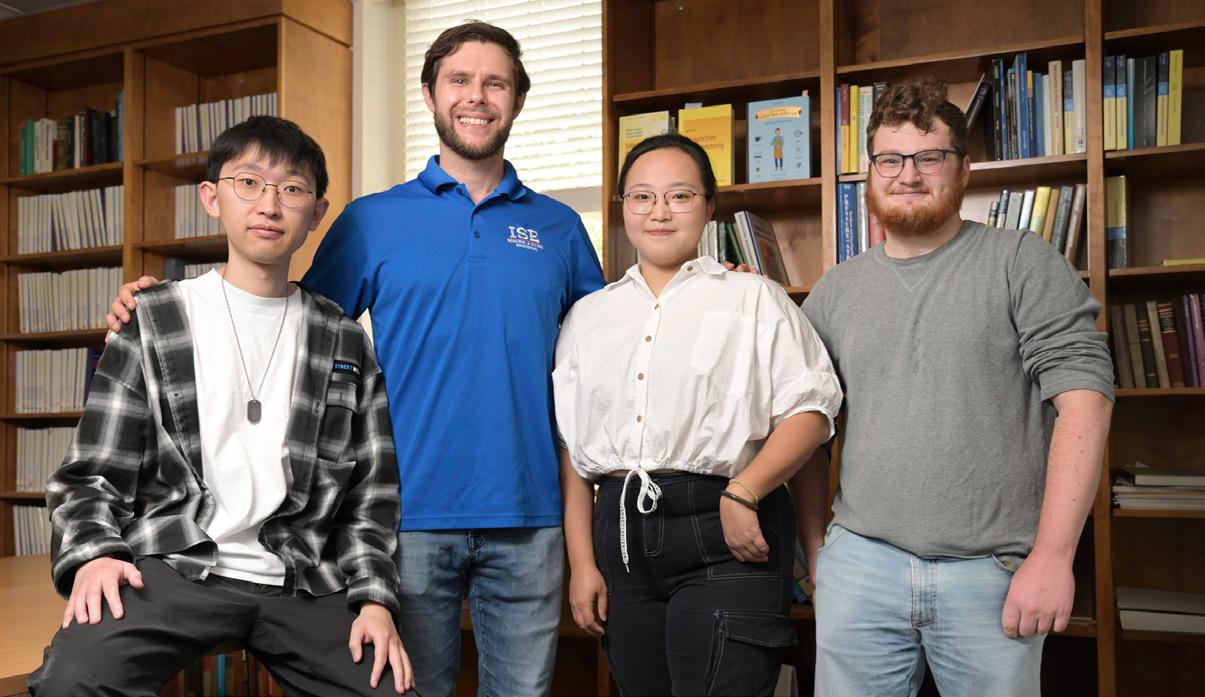
By Paris Carter
The Outreach Engineering Management (OEM) program at the University of Florida celebrated a major milestone in May as it surpassed 1,000 graduates. The achievement highlights the program’s success in shaping and cultivating future engineering leaders.
“I chose the OEM program for the flexible schedule, but what truly stood out was the cohort experience and lasting relationships,” said Shane Heindl, a design engineer at MasTec who was honored as the 1000th OEM graduate. “Each class gave me new tools to apply in my job, but I also learned just as much from hearing how my classmates applied the same material in their own roles.”
Offered jointly by the Herbert Wertheim College of Engineering and the Warrington College of Business, the 20-month interdisciplinary program leads to a Master of Science in Industrial and Systems Engineering (ISE) with a concentration in engineering management. Students also have the option to pursue a concurrent MBA, which can be completed with 12 additional months of study. The program includes courses in management, finance, accounting and marketing.

“OEM is a robust program that has stood the test of time. Reaching the 1,000 graduate milestone is simply a recognition that this is a successful program that fills an important gap in the educational portfolio of the state university system,” noted Serdar Kirli, Ph. D., former OEM instructor and current associate chair for undergraduate and professional programs in ISE.
OEM is designed for working professionals. Classes meet just one weekend a month in Orlando. The city’s central location, major industry presence and airport access have made it an ideal hub for OEM students across the state and country. The two-day weekend class format allows students to expand their professional networks and maintain close interaction with expert faculty.
“The flexibility of our program serves students well. Most of our students tell us they spend about 10–15 hours per week on each class. The flexibility of our schedule gives them the time to budget their own schedule as they need,” said Patsy Messinger, OEM’s associate director.
The program was a perfect fit for Shelley DiMaio, a working single mother who wanted to further her education.
“Balancing studies, full-time work, and being a single mom was challenging, but it was rewarding to set an example for my children,” said DiMaio, a recent OEM graduate. “They often joined me in studying, turning it into a competition, which led them to achieve A honor roll status and aspire to attend UF.”
DiMaio is now a program manager at a leading aerospace and defense technology company.
OEM’s close-knit, in-person format fosters meaningful connections among students.
“That shared, real-world perspective is something I wouldn’t have gained in a purely online or even a traditional in-person program,” said Heindl. “It was the long-term connections that made the difference.”
Kirli noted the immersive format, including evening office hours, gives students the support to balance rigorous coursework with full-time jobs and personal responsibilities. He emphasized that the wide range of engineering backgrounds among cohort members leads to dynamic classroom discussions.
“The classroom sessions are not necessarily unidirectional; often they involve discussions by many participants and lead to exploration of subjects in ways hard to anticipate,” said Kirli.
The program culminates with a capstone project in which students identify real workplace challenges — either from their own departments or through conversations with colleagues — and apply practical solutions. These projects often boost their visibility and open doors to management or leadership roles.
“The program helped me realize my passion and aptitude for strategy development, which guided me to choose a new career path,” said DiMaio. “The strategy-focused classes were where I excelled the most, affirming my decision.”
“Our alumni often report significant career advancement soon after completing OEM, including higher salaries, new leadership roles and challenging experiences that provide greater professional fulfillment,” Messinger noted. “I am struck by how frequently students also mention the lifelong friendships that they make in the program, and how important and enduring these overlapping personal and professional relationships become.”
DiMaio agreed.
“I made incredible friends who I now consider family,” said DiMaio. “I learned that even after 20 years away from school, with hard work, I could keep up with the younger generation.”
The program’s impact is evident through its alumni. Many alumni advance into roles such as engineering managers, senior engineering managers and directors and vice presidents of engineering firms. Several OEM alumni serve on the ISE advisory board and have been inducted into the UF ISE Hall of Fame.
As the program celebrates its milestone, OEM’s faculty remains
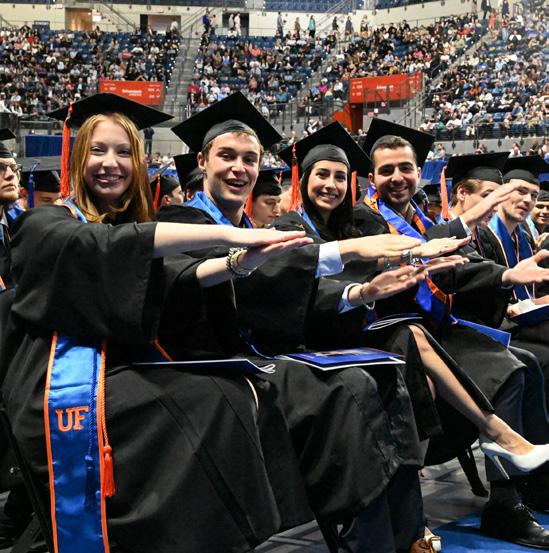

OEM graduate Shelley DiMaio tells her classmates and their families how OEM helped her navigate college as a single working mother.
focused on enhancing the graduate student experience. Future goals include strengthening the immersive classroom model, expanding industry partnerships, and continuously refining the curriculum to meet the growing demands of today’s workforce.
A new program begins each fall semester. For more information on how to apply, contact Messinger at 352-392-0982 or messinger@ise.ufl.edu.

By Brady Budke
The undergraduate program for the Department of Industrial & Systems Engineering (ISE) at the University of Florida was ranked No. 12 among public undergraduate industrial and systems engineering programs for 2026 by U.S. News & World Report.
“I am really proud to see our undergraduate program hold another impressive ranking among our peers,” said Iris V. Rivero, Ph.D., department chair. “We will continue to uphold our mission of delivering cutting-edge education and pioneering research across diverse areas of ISE.”
The department’s undergraduate program prepares students for successful careers in industrial and systems engineering and other related disciplines. The department offers flexible on-campus and online programs, along with opportunities for students to conduct research with faculty.

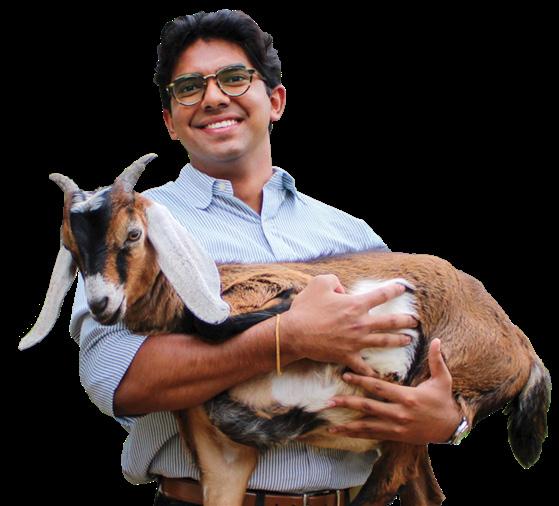
By Megan Howard
From farming to government to engineering, University of Florida Industrial Systems Engineering (ISE) student Allen Kurian doesn’t spend much time relaxing.
On the weekends, he can be found on his family’s Newberry-area farm, working in the barn or driving the tractor. During the weekdays, he can be found attending classes, running engineering organizations and working with students across the university.
After living in Gainesville for 13 years, Kurian said he could not imagine going anywhere else for college. The state’s Bright Futures scholarship and UF’s reputation as the best school in the state made other colleges dim in comparison.
Kurian also couldn’t resist being near his pharmacist dad, nurse practitioner mother and his farm’s citrus trees, goats, chickens and ducks. He shares his parents’ love for fresh, organic food but is taking a different path to a medical career.
He is interested in the behind-the-scenes work of medical care after spending high school summers volunteering at the Malcom Randall Veterans Affairs Medical Center, where his parents work.
“I would much rather create the tools that help thousands of patients indirectly,” Kurian said.
He discovered ISE, what he calls a “found major.” All it took was some time at UF’s student orientation, Preview, to take him
from business administration to industrial systems.
“The fact that our UF [ISE] program is the 11th best in the nation is truly amazing,” he said, referring to the ISE’s 2025 rankings from U.S. News & World Report. “The opportunities it has given me, I won’t find anywhere else.”
His passion for the program led him to pursue a combined bachelor’s/master’s industrial systems engineering degree. While he finishes his undergraduate degree, he is working on his master’s. Instead of taking two years to receive his graduate degree, he expects to be done in one year after graduating with his bachelor’s.
Kurian is drawn to the major because of the career stability and flexibility. Industrial engineers’ skills are applicable to almost any field. From aerospace companies like Lockheed Martin to healthcare companies like Johnson & Johnson to consulting firms like Deloitte, industrial engineers are in high demand.
“It’s a universal engineering degree. You can go into any industry and provide value,” he said.
But Kurian is much more than his studies.
Within ISE, he’s the vice president of UF’s Institute of Industrial & Systems Engineers chapter and the internal vice president of UF’s Society for Health Systems. Through these organizations, he mentors underclassmen engineers and connects with industry professionals.

He also works as a student assistant with the ISE office. He serves as a board member for UF’s Student Petition Committee and an Advisory Committee board member for UF’s Career Connection Center.
During the spring of his freshman year, Kurian realized that a vital part of advancement in engineering is policy.
He spent a year working in the student government cabinets.
“For any problem that has a solution, one of the biggest impediments to making that solution come to fruition is policy. And back then, I realized policy is probably one of the most important things,” he said.
His passion for outdoor spaces, like his family’s farm and Gainesville’s natural corners, led him to join Alachua County’s Recreation and Open Spaces Advisory Committee, where he serves as a board member.
“It’s a great initiative because Gainesville has a lot of natural beauty,” he said.
“We as a county, as locals, really try to reinforce and encourage support for that.”
This past summer, Kurian combined his passion for business, policy, and engineering in Washington, D.C., where he interned as a business technology consultant at Deloitte.
“I think that was probably be the best experience I’ve had so far,” Kurian said.
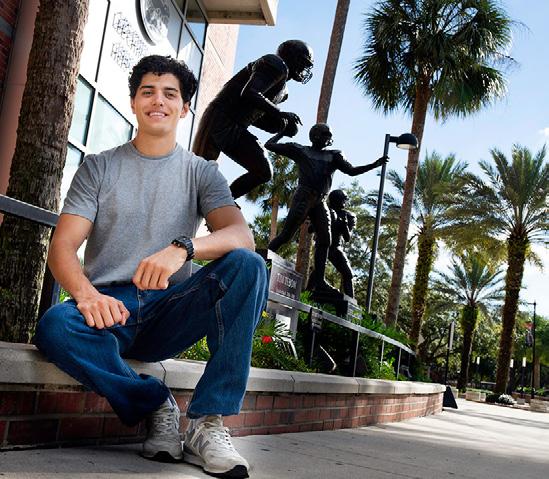
During its 30th annual awards ceremony, the International Center at the University of Florida honored 15 international students — from Italy to the Ivory Coast — for building cultural bridges across campus.
An industrial and systems engineering major, Yousef Bani Ahmad, who grew up in Amman, Jordan, and later studied at the United World College (UWC) in Japan, was a winner of the International Student Achievement Awards.
Ahmad, a diehard Gator football fan and former equestrian athlete, was nominated by many in the college who cited his community volunteer service (particularly with aging horses at Millcreek Farm) and his always-available mentorship of international students.
“He guides new international students through everything, from cars to places to live,” said Melony Goldsmith, Ahmad’s academic advisor. “He’s just very kind-hearted.”
Here is more about our award winner:
> HOW DID YOU FIND YOUR WAY TO UF?
After my time at UWC, I wanted to continue my education in an environment that values diversity and offers strong mentorship opportunities. I chose UF because of its welcoming community, academic rigor and the chance to make an impact.
> WHAT WAS YOUR REACTION WHEN YOU FOUND OUT YOU HAD WON AN INTERNATIONAL STUDENT ACHIEVEMENT AWARD?
Incredibly honored and humbled. It was a moment of reflection on how far I’ve come, from adjusting to life in the United States to being able to mentor others in their journey. This recognition reinforced my commitment to supporting diversity and inclusivity.
> WHAT DID YOU WANT TO BE GROWING UP?
Inventor or engineer. I am fascinated by creating things that could solve problems and make life easier.
> WHAT IS THE MOST INTERESTING PROJECT YOU HAVE WORKED ON AT UF?
The IMED (Interdisciplinary Manufacturing Engineering & Design) lab, researching and optimizing different bioprinting techniques. It’s a fascinating experience because I get to work with living microorganisms, operate 3D printers and collaborate with experts from various academic institutions, industries and government organizations. The interdisciplinary nature of the work makes it incredibly rewarding.
> WHAT ARE YOUR BIGGEST ACCOMPLISHMENTS?
Successfully completing a summer internship with [semiconductor equipment maker] ASML, contributing to production engineering and problem-solving. Mentoring international students, which has had a lasting impact on my mentees and myself. Embracing and celebrating diversity in my academic and personal pursuits.
> WHAT IS YOUR MOST MEMORABLE MOMENT?
Being part of the concrete canoe team at UF. Building a canoe out of concrete and then racing it against other schools was hilarious and thrilling. Seeing something as unconventional as a concrete canoe actually float — and compete — was an unforgettable moment that combined teamwork, engineering creativity and a bit of humor.
> WHAT IS SOMETHING MANY PEOPLE DO NOT KNOW ABOUT YOU?
After winning multiple national and regional titles for showjumping, I qualified for the Youth Olympics of 2018. However, I had an unfortunate accident with my horse, a few weeks before my travels to the Youth Olympics, that put an end to my career as a showjumper.
> WHERE DO YOU SEE YOURSELF IN 10 YEARS?
I see myself in a leadership role within the semiconductor or technology industry, working on innovative solutions and supporting global teams. I also hope to continue mentoring and inspiring others to embrace diversity and thrive in their careers.
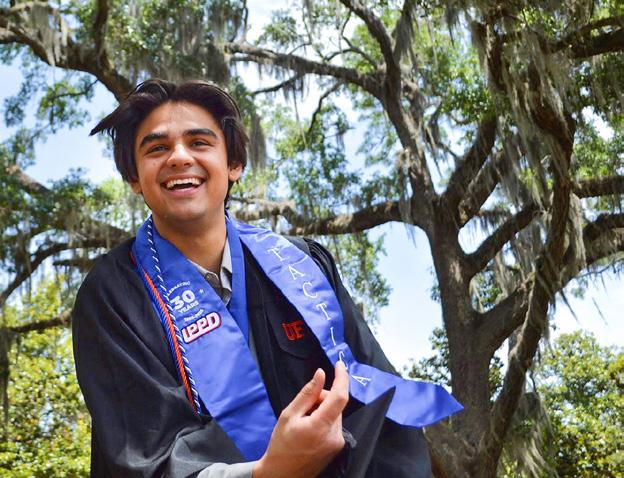
When Andres Espinosa isn’t optimizing supply chains, diving into transportation research or fine-tuning an AI model to compose video game music, he often can be found on the pickleball court or strumming his guitar.
“I’ve always needed variety,” said Espinosa, who graduated in May 2025 with a degree in industrial and systems engineering. “As a kid, I wanted to be everything from a lawyer to a Minecraft YouTuber. That’s why I fell in love with UF and industrial and systems engineering — there’s always something new to explore.”
Espinosa has lived a global life. Born in Orlando, he moved to Monterrey, Mexico, at the age of 6, then to Dubai, United Arab Emirates, São Paulo, Brazil and then to Gainesville for his undergraduate studies in UF’s Department of Industrial & Systems Engineering (ISE). He also speaks four languages: English, Spanish, Portuguese and French.
During his time at UF, Espinosa served as a teaching assistant for six engineering courses and was an ISE ambassador.
Outside of the classroom, Espinosa enjoys solving complex challenges. His mantra: “You can never create a solution that is better than your understanding of the problem.”
This determination helped him win first place at the ISE Symposium for best undergraduate research poster and recognition for his innovative project connecting music and AI.
Driven by a passion for learning and a deep love for music, he set out to fine-tune an AI model capable of generating original video game music. His work showcased technical skills and highlighted creative possibilities at the intersection of engineering and the arts — offering a glimpse into how engineering and creativity can shape music through AI.
Here is more about one of ISE’s busiest graduates:
> WHAT INSPIRED YOU TO EXPLORE THE INTERSECTION OF MUSIC AND AI?
I love any excuse to combine a personal passion with a professional/academic skill, so I decided I wanted to finetune an AI model to output video game music. I discovered that there was no reliable way to preprocess and standardize audio MIDI files. So, I built a small package to automatically standardize
By Paris Carter
over 14,000 MIDI files, which should help others who are looking to do similar work with music and AI.
> WHAT WAS THE FOCUS OF YOUR UNDERGRADUATE RESEARCH?
My thesis, titled “Learning to Dispatch: A Reinforcement Learning Formulation of the Train Dispatching Problem,” combined the fields of transportation and reinforcement learning in a formulation of the train-dispatching problem as a Markov Decision Process. The whole project was an incredibly enriching blend of operations research, computer science and transportation optimization.
> WHAT IS THE TRAIN-DISPATCHING PROBLEM?
The train-dispatch problem is a famous operations research problem. Currently, train schedules are organized by human operators using timetables where they do their best to minimize delays and keep customers satisfied. However, the tools they use can be very difficult to interpret and make quick and accurate decisions. The goal to solve this problem is to use operations research to minimize human errors and build tools that have a lot of low-level decisions automatically completed.
> WHAT WORDS OF WISDOM WOULD YOU SHARE WITH INCOMING ENGINEERING STUDENTS?
Be your past self’s biggest competitor and your future self’s greatest supporter.
> WHAT DID YOU ENJOY THE MOST ABOUT BEING AN ISE AMBASSADOR?
I really enjoyed being able to identify a problem in the department and create a solution, all while having the department’s support and resources. I am most proud of the Introduction to Research Program I started and led last semester where 14 incredible students led their own research projects to jumpstart their research progress.
> WHAT’S NEXT FOR YOU?
I wrapped up my second internship with Procter & Gamble and have started a prestigious, fully funded rotational master’s program in sustainable systems engineering through Erasmus Mundus, studying in Italy, Albania and France.

Carlos del Sol (BSISE ’72), a member of Dean’s Advisory Board at the University of Florida’s Herbert Wertheim College of Engineering, died on Nov. 24, 2024. Del Sol served as chair of the Department of Industrial & Systems Engineering (ISE) Advisory Board and was a member of the UF Alumni Association Board of Directors.
After graduating from UF, del Sol worked for General Electric Co. before moving with his family to New Jersey to join the Campbell Soup Co., where he served for 23 years. Upon retirement, del Sol moved back to Gainesville with his wife, Olga (BAE ‘74), dedicating much of his time and service to the community and UF. He was recognized with the UF Distinguished Alumnus Award in 2013 and the UF ISE Alumni Leadership Award in 2010. The del Sols supported student scholarships, UF’s STEP-UP program, the ISE department and the Herbert Wertheim Laboratory for Engineering Excellence.

Glenn Renwick (MSISE ’78), 70, chairman of the board and former president/CEO of the Progressive Corp., died May 16, 2025. Renwick and his wife, Deborah (BSN ’77), were substantial UF donors, including a $3 million gift that established the endowed Glenn and Deborah Renwick Leadership Professorship, the Renwick Leadership Program in AI and Ethics, and the Renwick Faculty Fellows in AI and Research. Their donations also funded the Renwick Engineering Scholars Fund. He was awarded the UF Distinguished Alumnus Award in 2011. During Renwick’s 32 years at Progressive, annual revenues grew from about $800 million in 1986 to $30 billion in 2016. Forbes twice listed him as one of the 40 most admired CEOs in the world. Renwick also received a Congressional commendation for having all water-damaged, Progressiveinsured cars in New Orleans destroyed, protecting unsuspecting buyers from purchasing them later.
Nearly 10 years after his death, diehard Gator and lumber magnate Harold D. Haldeman Jr. continues to make a difference for engineering students at the University of Florida.
A 1950 graduate of the Department of Industrial & Systems Engineering who first established a fellowship for ISE students in 2011, Haldeman died in 2016 at age 91. His wife, Marguerite Haldeman, established a memorial gift in 2017 that remained in a trust until her death in 2023.
Between 2017 and now, that endowment has grown to about $12.85 million, and it is being released to further expand ISE graduate programs. Specifically, the funds will be used to offer fellowships to graduate students to cover their tuition, fees and stipends.
“We are extremely grateful for the gifts the Haldeman family has provided to UF ISE throughout the years. Their generosity, so far, has financially supported our students, facilitating their involvement in leading-edge research during their education,” said Iris V. Rivero, Ph.D., the ISE department chair. “The endowment will not only continue to support our students’ professional development, but more importantly these funds will
lead to a transformative phase of ISE’s graduate programs.”
Haldeman was born in Tampa, Florida, and completed one year at UF before joining the U.S. Navy in 1944, where he served as an aviation electrician for two years until the end of World War II. He returned to UF and graduated with an ISE degree.

Haldeman later made his mark in wholesale lumber and logistics. Within two years of graduation, he became general manager of Forest Products Corp. of Fort Lauderdale, Florida, and, shortly thereafter, was named the president and the CEO of the company.
In 2011, he was initiated into UF ISE Hall of Fame in recognition of his distinguished record of leadership. The same year, he established the Harold D. Haldeman Jr. Fellowship to support graduate-student fellowships in ISE.
The Department of Industrial & Systems Engineering (ISE) added two successful executives to its Alumni Hall of Fame this spring, honoring two men who took their degrees to new heights.
Inducted were Kevin Teehan, a 1988 graduate and current technology consultant, and Eric R. Stern, a 1983 (bachelor’s) and 2011 (master’s) graduate and current executive partner at global research firm Gartner. Both inductees serve on ISE’s Advisory Board.
The UF ISE Alumni Leadership Awards program was initiated in 2009, with an inaugural Hall of Fame class inducted at the department’s 75th Anniversary celebration. ISE Hall of Fame inductees must have worked professionally for 15 or more years after graduation, created exemplary engineering outcomes, and made significant service contributions to the engineering discipline or UF. Nominees are submitted by either the ISE Advisory Board or faculty, along with faculty review and a vote on candidates.
“Receiving this recognition is an extraordinary honor, one that has given me a moment to pause and reflect on just how much Florida’s flagship university has shaped my journey,” Teehan said.
“I carry deep gratitude for the faculty, mentors, and classmates who challenged me, supported me, and helped lay the foundation for everything that’s followed. This isn’t just a professional milestone, it’s a personal one. I’ve always been, and always will be, proud to be a Florida Gator, a graduate of one of the premier public universities in the nation.”
Teehan credits ISE for the ability to solve complex problems through systems thinking strategic design, and human-centered innovation.
From leadership at Motorola to global transformation at lock-technology company ASSA
ABLOY, Teehan has led high-impact initiatives and advanced innovation in everything from
As an undergraduate at UF, Stern worked extensively with Luis Martin-Vega, Ph.D., on research with the U.S. Army.
After graduation, he joined Rockwell International (now Collins Aerospace) as an industrial engineer, focusing on manufacturing support and new facility layout and design. In management, he led manufacturing engineers, production leadership teams and program managers in Florida and Iowa. In 2007, Stern was promoted to senior director of operations, responsible for the Melbourne Operations of Rockwell Collins.
In 2012, Stern became the chief operating officer with Esterline Controls Systems in Los Angeles, leading the turnaround of an underperforming business.
In 2015, Stern was appointed vice president
manufacturing and healthcare to secure identity and critical infrastructure.
“My early career at Motorola began with the opportunity to contribute to breakthrough innovation in paging, wireless technology, semiconductor packaging, and access control —while actively building my engineering skills and gaining hands-on experience with advanced technologies,” he said. He now serves as a senior consultant, strategic advisor and fractional C-suite executive with the partners at Future Point of View, a technology strategy firm focused on helping organizations navigate disruption and lead through innovation
Teehan holds an MBA from the University of Chicago Booth School of Business and has completed executive programs at Harvard and the International Institute for Management Development. He remains committed to education, mentorship and lifelong learning through his advisory roles, volunteer work, and support of the UF community.
of regional operations, Americas for Meggitt customer services and support. Meggitt is a global company specializing in components for aerospace, defense, and energy companies.
Since 2017, Stern has worked as an executive partner in supply chain with Gartner, where he advises Fortune 500 senior executives.
“I am honored to be receiving the Alumni Leadership Award from the ISE department at the University of Florida,” Stern said.
“The education and support I received from UF during my undergraduate years and later as I earned my master’s degree through the Outreach Engineering Management program have been instrumental in shaping my career and achievements. I enjoy staying connected to the school through my work on the [ISE] advisory board and in other ways, helping the ISE department grow and adapt to meet the needs of our future engineers.”


For the second consecutive year, Scott Bartnick, a 2015 graduate of the Department of Industrial & Systems Engineering at the University of Florida, has been named a Gator100 honoree. The award honors UF alumni who have created some of the fastest-growing businesses in the world.
Bartnick is the co-founder and CEO of Otter PR, which was ranked No. 32 on 2025’s list of honorees.
“Being named to the Gator 100 is a huge honor,” Bartnick said. “Last year, I remember sitting in the auditorium feeling incredibly proud — not just to be a Gator, but a Gator engineer and alumnus.”
After attending UF, Bartnick spent several years working for Fortune 500 companies before launching his first entrepreneurial venture as an Amazon service consultant and brand marketer. He is an internationally renowned e-commerce and media expert who has been featured in Forbes, Entrepreneur and IBTimes.
“Right out of UF, I joined Eaton Corp. — a Fortune 500 company
A diehard snowboarder, Bartnick is an avid traveler who hopes to visit every continent.
— in their leadership development program,” he said. “My first role was in continuous improvement, and I used a lot of what I learned in my UF engineering courses: plant layouts, lean systems, process optimization. Those skills made me successful early on and opened new doors for me.”
One of his earliest ventures, The Five Day Startup for e-commerce consulting, was turned into a successful book in 2018.
During the onset of the COVID-19 pandemic in early 2020, Bartnick co-founded Otter Public Relations with Jay Feldman, who is also a UF alum. It became a multi-million-dollar media agency working with some of the world’s top thought leaders, businesses and entrepreneurs. Bartnick’s insight and expertise help clients break into mainstream media and grow their brand globally.
He said his time at UF was key to his success.
“In leadership roles, I relied heavily on the interpersonal skills I developed in Greek life and extracurriculars, things
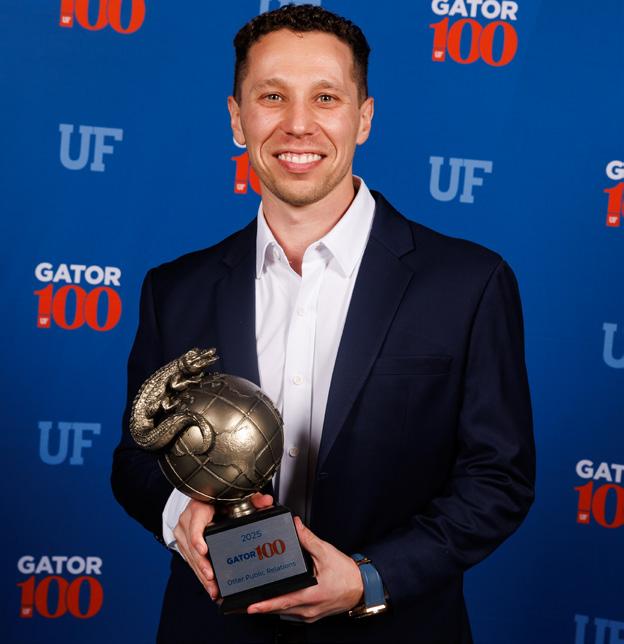
like managing events, philanthropy and communicating with teams,” he said. “When I transitioned into entrepreneurship, I started applying my technical knowledge again, especially as my business grew and I needed to optimize operations.
“UF gave me the foundation, the opportunities and the confidence to grow as a professional, and I wouldn’t be where I am today without that experience.”
This two-time Gator100 member is all about the orange and blue. Asked about his favorite spot on campus, he answered quickly: The Swamp. No question.
“I have so many great memories watching games there,” he said.
“I was lucky to be at UF during the Tim Tebow era and watching the basketball team win another national championship this year just reminded me again how proud I am to be a Gator.”
The company has been listed as the No. 1 PR firm by Clutch, G2 and UpCity. Based in Florida, the awardwinning team of 45-plus experts guarantee media coverage monthly. With more than 35 awards and features in Forbes & The New York Times, the company redefines PR. Otter PR’s proprietary OTR™ method emphasizes Outreach, Trends and Relationships. The company’s mission is to ensure clients’ narratives stand out.
DEPARTMENT OF INDUSTRIAL
SYSTEMS & ENGINEERING
P.O. BOX 116595
GAINESVILLE, FL 32611-6595
WWW.ISE.UFL.EDU
UFISE UF_ISE

Industrial & Systems Engineering
UNIVERSITY of FLORIDA